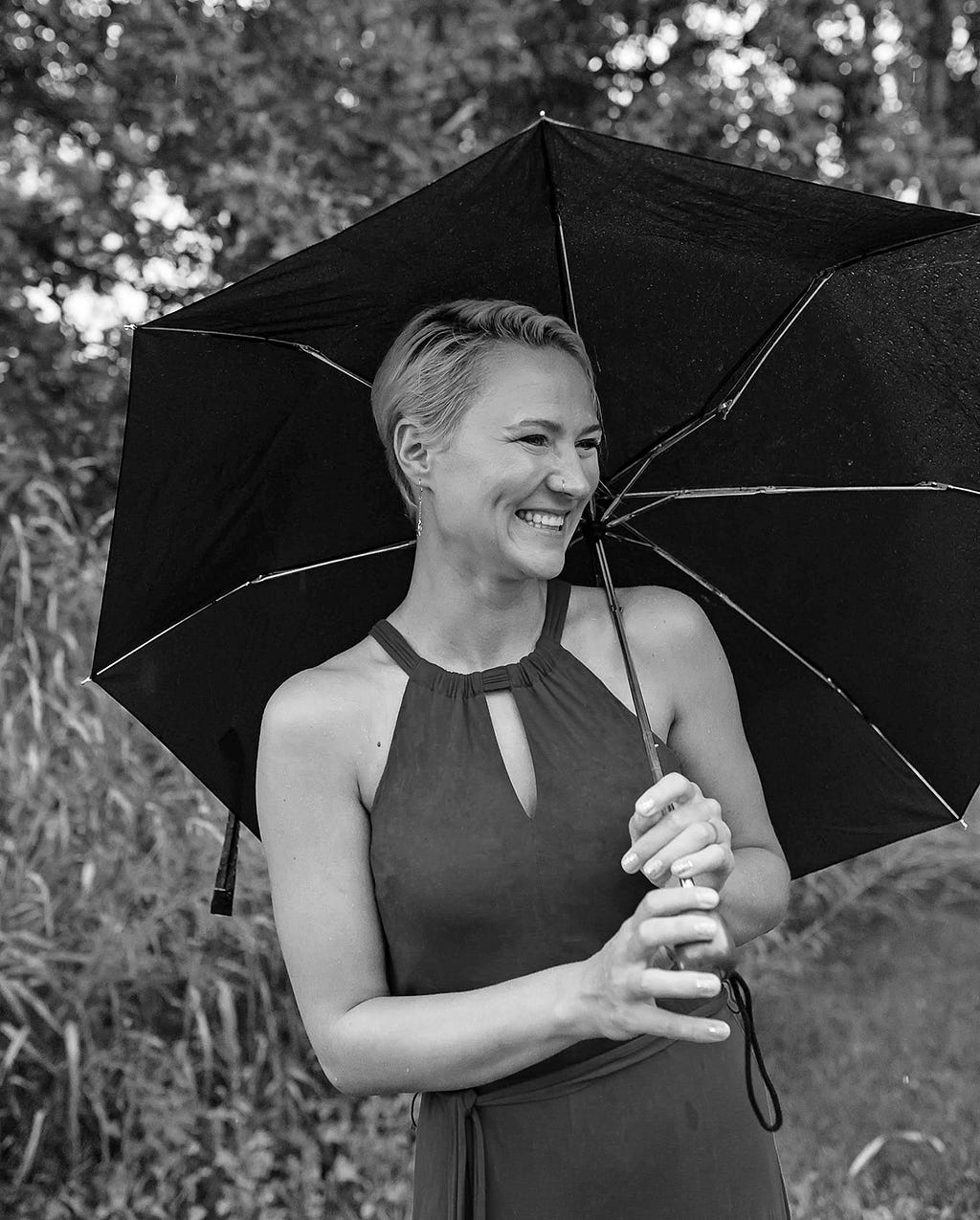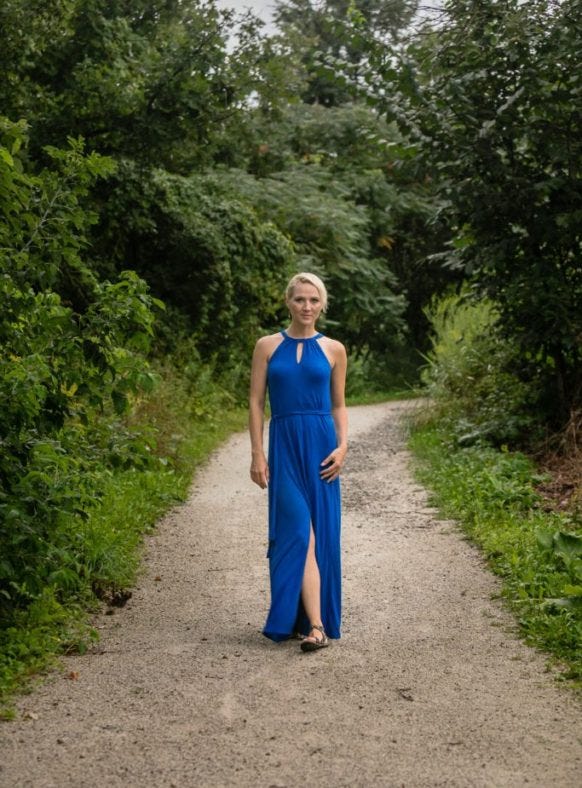
Redefine success. I measure success by whether or not I went for it and gave it everything I had. I measure success by how much I learned in the process. Whether or not I achieved my goal yet is secondary. The path to loving and appreciating yourself is so much more meaningful when you truly respect what you do.
I had the pleasure to interview Maryna Shkvorets. Maryna is a public speaking coach and strategist specializing in engagement and persuasion. She is obsessed with the fact that to truly shine, you don’t have to change who you are. You can just turn up the parts of yourself you already love, and Maryna teaches people how to do just that.
Thank you so much for joining us! I’d love to begin by asking you to give us the backstory as to what brought you to this specific career path.
You know that person who just freezes anytime they have to speak in front of a group? They could be prepared and capable, but the moment they they stand up to speak — everything goes out the window. That’s my favorite client.
I actually remember standing in those exact shoes and just wanting to hide. If you seek advice from any other expert — you’ll hear tips like “just speak from the heart” and “use open body language.” Thanks, but that doesn’t work when you’re completely drawing a blank. I had to approach public speaking from a completely different perspective. I had to come to terms with the fact that I had to work a little harder at first.
In the end, working on yourself and addressing the problems that are within your own control always pays off. That’s why I coach public speaking — what you invest into it is nothing compared to what you get out.
Are you working on any exciting new projects now? How do you hope that they might help people along their path to self-understanding or a better sense of wellbeing in their relationships?
Actually yes! I have created a free online workshop: How to give an amazing talk — especially if you’ve failed in the past.
Although this focuses on public speaking, it’s actually about facing fears and developing an inner sense of confidence. I hope that this will give people more strength to express themselves and shine light on who they truly are.
Was there ever a tipping point that triggered a change regarding your feelings of self-love and self acceptance?
I’m sometimes caught between my desire to expand and the old adage to “just be yourself.” I finally realized that being yourself does not mean you have to be stuck. Self-love is a trust in yourself that you can step outside of your comfort zone and still feel like you belong.
If stepping outside of your comfort zone leads to a mistake — even a huge one — self-love is a willingness to forgive yourself, to pick up the pieces, and to try again.
I face this tipping point almost every day because every day brings something different.
When we talk about self-love and understanding we don’t necessarily mean blindly loving and accepting ourselves the way we are. Many times self-understanding requires us to reflect and ask ourselves the tough questions, to realize perhaps where we need to make changes in ourselves to be better not only for ourselves but our relationships. What are some of those tough questions that will cut through the safe space of comfort we like to maintain, that our readers might want to ask themselves?
Asking yourself questions is a powerful way to explore what you really want and how to go after it. I sometimes like to ask myself a question early in the morning and allow my subconscious mind to bring me answers throughout the day. You’d be surprised by what you can discover if you just ask the right questions. Here are two examples:
“What would it take to feel confident today? You can change this question to anything you’re working on, but it’s a really good way to shift focus and discover what you really want.
“Why am I afraid to do this?” Just allow yourself to feel it through. This takes practice, and it may involve asking yourself more questions, but in the end it will lead to a first step to real growth.
So many don’t really know how to be alone, or are afraid of it. How important is it for us to have, and practice, that capacity to truly be with ourselves and be alone (literally or metaphorically)?
I notice that when facing even a few moments alone, people seek a distraction. (Usually in the form of a screen.) It’s really important to discipline ourselves to resist that urge. It actually takes a bit of practice to start enjoying and then craving these moments for introspection. I love having a chance to just sit and think or to write.
Training myself to reflect is what led me to take important steps towards a life I actually wanted to live. I couldn’t have done that by living on autopilot.

In your experience, what should a) individuals and b) society, do to help people better understand themselves and accept themselves?
We expect that this self-love and acceptance should just occur organically, but it actually takes work and discipline. Here are a few things that help me:
Journaling. For me, it’s by putting pen to paper that I can actually explore my own thoughts. Don’t get turned off if you’re too distracted to actually reflect. It could take weeks to start really expressing and understanding yourself.
One place to start is by asking yourself questions or by finding some journal prompts online.
An outlet. I mentioned that our habits make us seek a distraction, and eventually you might think to yourself “well what’s wrong with a little TV or Facebook, I deserve to decompress” Nothing’s wrong with it, but it just doesn’t allow your brain to experience a moment of quiet discomfort.
A good balance for this is to allow yourself to indulge in distraction at predetermined times. Set an intention in advance — “first I’ll do some journaling or reading and then I’ll allow myself an hour of screentime.”
Self-forgiveness. There will be days where you behave as the opposite person of who you truly want to be. You may be lazy. You may be afraid. You may be mean and self-deprecating. And acknowledging this may make you feel even worse. But then you have to forgive yourself and choose a new path. “That was me yesterday, today I’m making a different choice.” Do this as many times as it takes. Nothing good comes from hating yourself.
What are 4 strategies that you implement to maintain your connection with and love for yourself, that our readers might learn from? Could you please give a story or example for each?
Redefine success. I measure success by whether or not I went for it and gave it everything I had. I measure success by how much I learned in the process. Whether or not I achieved my goal yet is secondary. The path to loving and appreciating yourself is so much more meaningful when you truly respect what you do.
Gratitude journal. Much like asking the right questions, taking a moment to be grateful is a great habit. I do this both in the morning and at night. And I write two-pages worth on those days when I feel like nothing’s going right. It’s a total mood-booster, and it shifts your self-talk from negative to positive.
Start your day with a luxurious stretch. Some days connecting with yourself can be a little hard, so give yourself a head-start with a two-minute stretch while still in bed. It’s amazing how much your body can affect your brain. Stretch out your arms and legs to make you feel victorious and alive and allow your mood to follow.
Read something inspiring today. Give yourself the intention to feel inspired and pick up something to read. Ask yourself what could you take away to feel more alive and self-accepting. Even if you’ve read it before, you’ll see it with a new pair of eyes.
What are your favorite books, podcasts, or resources for self-psychology, intimacy, or relationships? What do you love about each one and how does it resonate with you?
On the topic of reading something inspiring, my most recent read was Mindset by Carol Dweck. Her research on the growth mindset really blew my mind over a decade ago, and I’ve been singing her praises ever since. However, after reading this book, I realized that I still have a long way to go in fostering this mindset myself as it relates to self-discipline and self-acceptance, which is actually really exciting — I love a challenge.
You are a person of great influence. If you could inspire a movement that would bring the most amount of good to the most amount of people, what would that be? Maybe we’ll inspire our readers to start it…
Fail once a day. I love the expression “failure is not an option,” but I dare you to flip the script. Do something scary with the expectation to fail. Offer to give a talk at a conference, or ask for a discount at Neiman Marcus. Go for something you’ve never dared, and instead of thinking “it won’t work, what’s the point,” say “I wonder what I can get away with.” You will see that failure is not a definition of who you are, quite the opposite in fact, and you will have a greater appreciation for yourself for stepping out of your comfort zone.
Can you please give us your favorite “Life Lesson Quote” that you use to guide yourself by? Can you share how that was relevant to you in your life and how our readers might learn to live by it in theirs?
“Failure is a stepping stone to success”
Sometimes I wish that everything I did was an instant success. But that would only mean that I am not trying anything challenging. I do have mentors and it does help to stand on their shoulders, but there is no rulebook for anything that’s truly important. I learned that I have to go for it, I have to give it my all, and I have to be okay with what happens next.
Thank you so much for your time and for your inspiring insights!
“Why we need to redefine success” with Maryna Shkvorets and Fotis Georgiadis was originally published in Authority Magazine on Medium, where people are continuing the conversation by highlighting and responding to this story.



